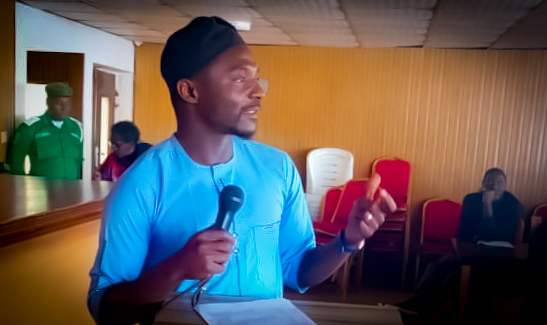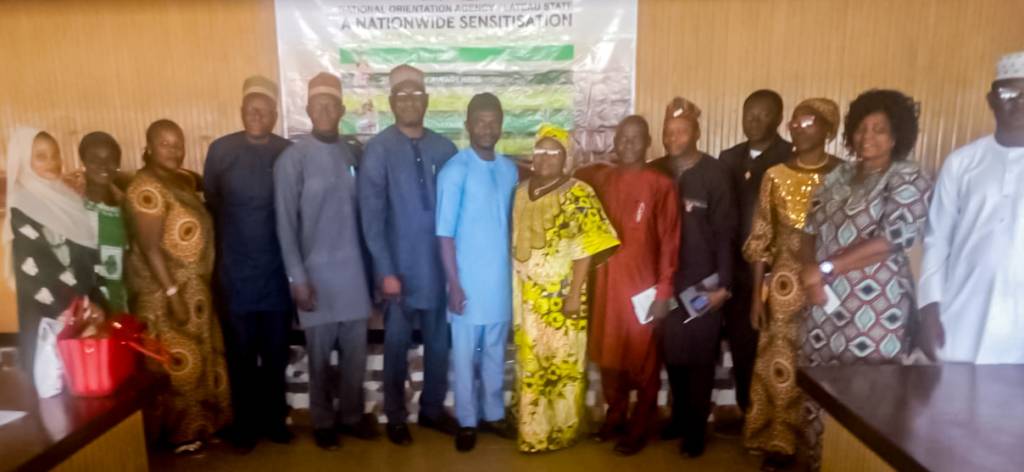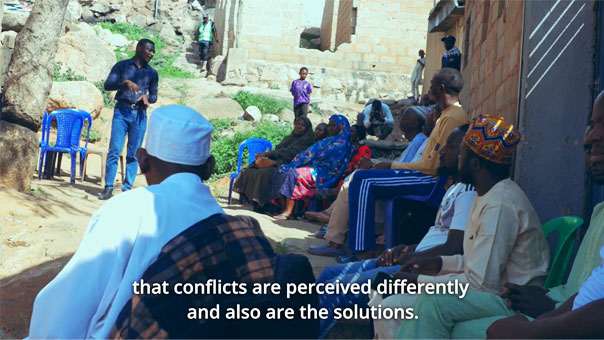13/12/2024
The chief Executive Officer of YIAVHA Mr. Jacob Choji Pwakim deliver a Keynote Speech as part of a Nationwide Sensitization Campaign on HIV/AIDS, Peace and Security, the Get-Rich-Quick Syndrome, Human Rights, and Tax Reforms: Promoting Awareness, Ethical Values, and National Development

Distinguished Stakeholders, Members of the Press, and Fellow Nigerians,
Today, we gather not merely as representatives of different sectors but as key actors in the urgent task of reshaping our dear country into one where citizens live with dignity. First, I would like to commend the National Orientation Agency for convening this meeting and similar gatherings. However, I must emphasise that this meeting would achieve its purpose more effectively if there were an intention to collate feedback from citizens, enabling the government to make informed policy decisions. My role today is simply to spark a conversation, while we listen to other, more in-depth perspectives, if my assumptions are correct.
To set a clear context for a successful discussion about promoting awareness, ethical values, and national development, we must reflect on the countless young people in Jos, Shendam, Riyom, Mangu, Bokkos, Bassa, and other areas. Their definitions of justice and survival have been shaped by the mass graves littering their communities and the recurring, helpless loss of loved ones. Our situation has worsened because we have wrongly assumed that everyone has moved on, including those who have lost their livelihoods, identities, and comfort.
I also want to draw attention to how we have limited the conversation about the “get-rich-quick” syndrome to the actions of young people involved in fraudulent activities. In the past, we attributed such actions mainly to foreigners, but as we say in Nigeria, “everybody go soon collect breakfast.” We must stop misleading ourselves by focusing solely on youth, while ignoring the systemic corruption in our communities. Misappropriation of funds by leaders at all levels, whether for public school renovations, peace initiatives, healthcare improvements, or pensions, has normalised a culture of dishonesty. This culture trickles down to individuals who exploit systemic loopholes. On what level can he take home pay of people who actually support people who have committed so much into work to meet up to their needs? Or how well do government agencies and departments actually get to do the work expected of their offices with ease, so, budgets do not amount to releases and releases of funds do not amount to availability of money for the work because of corruption. So, we know that a lot is wrong with the systems yet we accommodate it because it could one day be our turn to loot.
Additionally, care and support for the HIV/AIDS community should not be reduced to mere media campaigns. The effectiveness of our healthcare facilities speaks volumes about our priorities. Beyond ensuring adequate healthcare facilities to meet the needs of all, including marginalised groups, we must acknowledge the deeper socio-economic pressures pushing young people toward risky survival strategies. The moral compass in society has been lowered, leaving many parents in a dilemma, either celebrating their children’s contributions through illegitimate means or turning a blind eye to their questionable activities. This situation exacerbates the HIV/AIDS crisis, producing more undetected cases because people care less about testing for the virus or even accessing facilities for antiretroviral therapy.
Furthermore, the “it’s-my-turn” syndrome, rooted in the erroneous dichotomy of a Muslim North and Christian South, has perpetuated suspicion and division. Policies are often scrutinized through a biased lens of ethnic and religious favoritism. For instance, the immediate past president faced challenges addressing the farmer-herder conflict due to his Fulani ancestry. Similarly, current tax reforms are perceived as disadvantageous to the North. Ironically, the engagement of ex-agitators in the South-South might have been dismissed if the late President Yar’Adua had hailed from that region. This ethnic and religious bigotry undermines national unity. We must recognize that hunger and poverty do not discriminate based on tribe or tongue.
So, by way of concluding on this introductory section, the issues we are focusing today, HIV/AIDS, peace and security, the get-rich-quick syndrome, human rights, and tax reforms, are deeply interwoven with the socio-economic realities and power dynamics that define us as a people. These issues have a lasting impact on national development, replacing traditional values with survival instincts. This campaign must not be another tea party where events conclude with no meaningful resolutions or commitments.

World AIDS Day
As we delve into these pillars of discussion, I begin with World AIDS Day. Let me reiterate: access to healthcare is a fundamental right, not a privilege.
In 2020, UNICEF reported that Nigeria had the second-highest burden of HIV/AIDS globally, with approximately 190,950 new infections annually. By 2023, nearly two million Nigerians were living with HIV/AIDS, with access to antiretroviral therapy (ART) remaining below the global average due to barriers like poverty, transportation costs, laboratory fees, and side effects. These statistics only account for those tested or diagnosed due to other illnesses. The question remains: what is the true prevalence of HIV/AIDS?
In a society where access to healthcare is a function of wealth, HIV/AIDS continues to thrive among the most vulnerable. While we commend efforts to provide antiretroviral treatment and testing services, reduced foreign aid and new socio-economic challenges have created additional hurdles. Each World AIDS Day should go beyond commemoration to serve as a platform for reflection and advocacy, focusing not just on supporting those living with HIV but on improving universal access to healthcare.
To halt the spread of HIV/AIDS, we must:
- End stigmatization so people feel safe getting tested and knowing their status, reducing the tendency to attribute deaths to “witchcraft.”
- Address socio-economic determinants of health, such as poverty and unemployment, which serve as pull factors.
- Ensure transparency in the management of healthcare resources, including antiretroviral drugs.
- Revise awareness strategies, particularly preventive education for young people.
Let us seize this moment to commit to actionable resolutions that address these pressing issues and build a more inclusive, ethical, and sustainable society right from our places of influence.
Peace and Security
While acknowledging that health system failures account for the highest cause of death in Nigeria, insecurity has become the second leading cause, with lives lost to communal conflicts, terrorism, insurgency, socio-economic disputes, vigilante actions, and extrajudicial killings.
Nigeria’s heightened vulnerability index is exacerbated by poverty, unemployment, weak governance, and limited access to social services. Regions with high levels of displacement and violence, such as the North-East and North-West, face particular risks of further destabilization, as reported by ReliefWeb on July 17, 2024. As of late 2023, Nigeria had 3,397,531 internally displaced persons (IDPs), primarily due to conflicts and violence. Approximately 2.3 million of these IDPs were in the North-East, with significant numbers in the North-Central and North-West. In 2023, rural banditry caused 892 deaths, a reduction from 5,725 in 2022. The highest fatalities occurred in Katsina, Niger, and Zamfara states. Additionally, kidnappings claimed 536 lives across 28 states in 2023, down from 1,145 in 2022, as reported by Nigeria Watch. While improvements are evident, much work remains to be done. Kudos to our security forces for promoting kinetic approaches and to other stakeholders, including civil society organizations, for championing non-kinetic approaches.
Impunity has bred its own challenges, as attackers often go unpunished. The inability to arrest and prosecute those responsible for attacking communities and commuters echoes the biblical phrase, “Oh Israel, to your tents.” This occurs despite Nigeria’s robust security formations and substantial budgetary allocations. The failure to support victims of attacks further escalates insecurity, leaving individuals with scars unhealed by justice.
When examining peace and security, it is important to reflect on the approaches employed to ensure the durability of peace. The government has largely focused on kinetic measures, considering them most effective in counterterrorism. However, there is an emerging shift towards non-kinetic approaches, such as the establishment of community dialogue platforms by Operation Safe Haven. While firearms may neutralize terrorists, they cannot eliminate terrorism itself. Community-led dialogue mechanisms have proven significant, reducing the costs of maintaining peace and the response time of government forces, who are often far from conflict hotspots.
We commend the Plateau State government’s use of technology, such as drones, to reduce community vulnerabilities. However, it is mind-boggling that, in this digital age, kidnappers continue to use phones to demand ransom without being traced. Beyond drones, we must explore how technology can make committing crimes and mass atrocities far more difficult. The inability to trace kidnappers through technology exposes the lucrativeness of such crimes, making them attractive.
A people-centered security model, where communities collaborate to lead dialogues and safety measures, is essential. However, the government must maintain oversight and ensure that the use of force remains within its jurisdiction. Communities must recognize that the illegal possession of firearms poses a threat to everyone. Because such arms have historically provided protection, relinquishing them is often seen as an act of betrayal. However, these weapons are increasingly used for criminal purposes, deviating from their original intent. Local power actors must take deliberate steps to address the stockpiling of arms.
International Human Rights Day?
As society increasingly seems to operate on a “survival of the fittest” model, the International Human Rights Day serves as a reminder that human rights are universal, inalienable, indivisible, interdependent, interrelated, and non-discriminatory. It is an opportunity for policymakers, partners, and citizens to assess gaps in the justice system, which should naturally protect the rights of all citizens.
On December 10, 2024, we once again celebrated International Human Rights Day. As always, we flaunted our colors, especially in solidarity with survivors of gender-based violence and other abuses. International organizations spent significant funds to mark the day and demonstrate global solidarity. Ironically, limited funds are allocated for pro bono legal support, safe spaces, and psychosocial support for survivors of abuses and violations. These violations occur across all demographics, testing the strength of our enforcement mechanisms. When violations go unchallenged, they become normalized, replacing the values that should define us. When citizens resort to mob actions over the justice system, it reflects a lack of faith in institutional processes.
We must strengthen legal frameworks to address human rights violations, including gender-based violence, child trafficking, and the illegal detention of citizens.
As asserted by the National Director, it is crucial to establish support centers for survivors of abuse and violence, in collaboration with civil society, across local governments and communities. Traditional leaders must play a pivotal role in closing the gap on human rights violations.
We must not assume that everyone is aware of their rights. There is a need for widespread awareness campaigns to educate citizens about their rights and responsibilities. Citizens must also understand that their rights end where another person begins.
Tax Reforms
Recently, the president submitted 4 tax related bills to the national assembly, they include the Nigeria Revenue Service establishment bill 2024; The Nigeria tax administration Bill 2024; The joint Revenue board establishment bill 2024: and The Nigeria Tax Bill, 2024.
The reform has been argued to emphasize expanding the tax base of the country to include sectors and individuals that were previously untaxed or under-taxed. This ensures a fairer distribution of tax responsibilities, reducing the burden on a narrow group of taxpayers.
Also, by streamlining the tax process and the digitalization of the tax regime, it reduces bureaucratic hurdles and the reforms aim to make compliance easier for businesses and individuals. The key assumption here is that Simplified tax systems encourage voluntary compliance, reducing evasion and avoidance. This also lowers administrative costs for both taxpayers and the government. Also, the digitalization of tax systems, as proposed, can reduce leakages, improve monitoring, and ensure that revenues reach the government.
Also, the harmonisation and coordination of revenue administration where some businesses face multiple taxes from federal, state, and local governments, leading to inefficiencies. For instance, a business in Lagos may be taxed by the Federal Inland Revenue Service (FIRS) and Lagos State Internal Revenue Service (LIRS) on similar income, causing confusion and double taxation. Now, when this is harmonized, it will ensure that taxpayers are not overburdened. It also upholds the tendencies of attracting investors, reducing administrative costs, and enhancing government revenue. On the other hand, it goes beyond tax collection. These funds should be used for the good of the people, by improving infrastructure, healthcare, and education in communities.
The reform is said to focus on creating a tax environment that incentivizes investment, job creation, and economic growth. For instance, there is a proposal to reduce company income tax from 30% to 25% and minimum tax for loss making companies have been eliminated. Though there is a proposed increase in VAT rates from 7.5% to 10% in 2025 but like we have said, there is support for Small companies with turnover of less than 50 Million to be exempted from tax.
The tax reforms proposed by President Tinubu have sparked significant debate, with several concerns raised by critics and stakeholders. 1. Broadening the tax base may inadvertently increase the financial burden on individuals and small businesses struggling with rising living costs and inflation thereby opening the door for evasion and uprising especially when the government doesn’t meet up to transparent management of these funds in a manner that addresses citizens key challenges. We must mention here that Indirect taxes, like VAT, often affect all consumers regardless of income, increasing the cost of basic goods and services .
The redistribution of these VAT funds based on the new sharing formular is already spacking confusion that may undermine the unity of the country and economic stability. Each state may have to have the powers to regulate what comes into their state because, we can’t have the goods produced in Lagos for instance with remittances of PAYE to Lagos state while Plateau for instance consumes it and gets a paltry sum of the income. States will decide what they allow into their state. ,
Conclusion
In conclusion, Nigeria stands at a critical juncture where our commitment to the national agenda must transcend rhetoric and become a shared culture, a journey towards true nationhood. While progress has been made, particularly as poverty seems to unite us, we must aspire to build a nation rooted in love and mutual respect. However, this cannot rest solely on moral obligations; the government must demonstrate accountability, especially in managing taxpayers’ money.
Our judicial system must reclaim its role as the last hope of the common man, not an appendage to the highest bidder. The erosion of trust in the judiciary has led many to create “governments within governments,” further fragmenting our nation. Security must remain citizen-focused, but the role of force cannot be relinquished to civilians, regardless of their effectiveness. Government funding should prioritize both peace and security interventions because peace, though costly, is indispensable. Also, incorporating technology into the fight against criminality is non-negotiable in this era.
Ladies and gentlemen, leaving this country should not be an option. True allegiance lies in our collective resolve to lead the change necessary to lift Nigeria from the despair we have all experienced. We must work to ensure that future generations will look back and say, “Once upon a time, we overcame.”
As stakeholders in various spheres of influence, we owe this country our determination, courage, and unwavering commitment to being agents of change.
God bless Nigeria.


